We first began our goshala in 2013 when Vamana the bull was donated to our temple in Orissa, by a local villager. He had been coming to our temple every day for two years prior to that and we had been feeding him every day. After some time he didn’t want to go home and was spending all his time at our ashram. Seeing this, the owner agreed to donate him to the temple, and that was the beginning of our goshala.
About a year later, a sadhu who stays in the forest around 50 km from here wanted to give a female calf to our ashram. Her name was Yamuna. As soon as she entered our goshala she and Vamana became best of friends. Early this year the same sadhu wanted to donate a bull calf named Vasu to our ashram. He also fit in perfectly with the others and they all became best friends. So at present we are taking care of two bulls and one cow.
The aim of our goshala is not to get milk or anything else from the cows, but simply to serve them as an offering to God. Protection of cows is essential for the establishment of Vedic culture. The entire Vedic culture revolves around respect to cows.
Yajna, sacrificial offerings, are the central pivot of the dharma chakra. The essential ingredients for yajna are ghee and cow dung, which both come from the cow. Without the cow, our link to the devas, the universal controllers of nature, is lost. Therefore it is said that within the body of the cow reside all 330 million devas, and by worshipping the cow one automatically worships and pleases the 330 million devas.
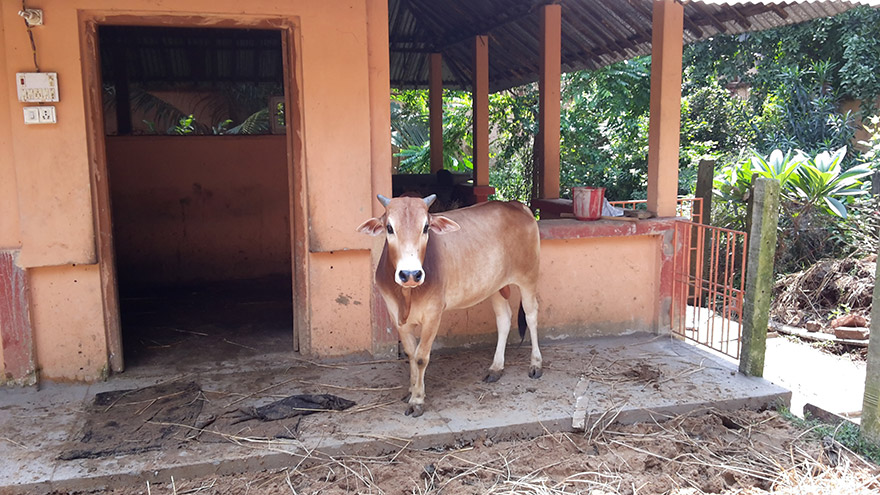
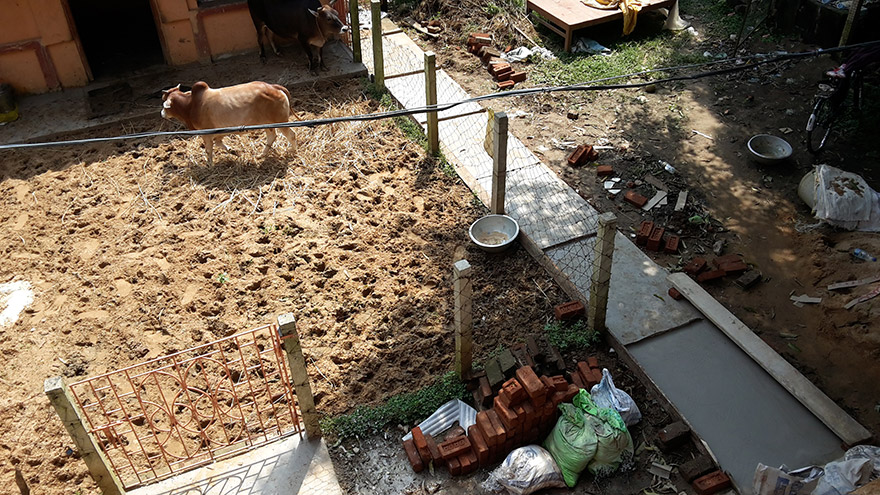 Besides our three residents, we also daily feed two homeless bulls, and four baby calves who visit our ashram twice a day. The baby calves have been coming for several months, and always show up at our ashram gate at 7 am, mooing so that we know to let them in. The two bulls have been coming to our ashram for food for 5 years. Originally there were three bulls, but one became very old and passed away a couple years ago.
Besides our three residents, we also daily feed two homeless bulls, and four baby calves who visit our ashram twice a day. The baby calves have been coming for several months, and always show up at our ashram gate at 7 am, mooing so that we know to let them in. The two bulls have been coming to our ashram for food for 5 years. Originally there were three bulls, but one became very old and passed away a couple years ago.
The roaming bulls come to our ashram twice a day, in the morning and the evening. Anytime there is heavy rain or a flood, they will always come to our ashram because they know they will get nice food and a warm place to stay. Last year when there was severe flooding in our city due to a cyclone, the bulls all showed up at our ashram and spent the night in various rooms.
The homeless bulls are always welcome to stay in our ashram goshala, but they have been accustomed their whole life to roam and don’t like to stay in one place very long. Still, they know where to come when they are hungry or need anything.
We feed everyone wheat bran mixed with water, and a little salt. We have tried various feeds for them (such as rice bran, pellets, etc.) and found all cows prefer wheat bran over anything else. Next month we are going to try to grow some tall feed grass to give them some more greenery.
In the Gavopanishad the glories of the cow are stated as follows:
gavo bhutam ca bhavyam ca
gavah pushtih sanatani
gavo lakshmas tatha mulam
gosu dattam na nasyati
“The cow is the past and future. She nourishes the health of all living entities, and she is the root of prosperity. The piety one achieves by feeding a cow in never destroyed.”
annam hy paramam gavo
devanam paramam havih
svahakara vasat karau
gosu nityam pratishthitau
“The cow is the cause of one’s accumulation of food grains. She awards the best sacrificial ingredients to the demigods. The sacrifice of the demigods and the sacrifice of Indra are both performed on the basis of the cow.”
gavo yajnasya hy phalam
gosu yajnah pratishthitah
gavo bhavishyam bhutam ca
gosu-yajnah pratishthitah
“It is the cow which awards the result of sacrifice. The performance of sacrifice is dependent upon her. She is the past and future. All sacrifices are based upon her.”
sayam pratasca satatam
homa kale mahadyute
gavo dadati vai homyam
rishibhyah purusharshabha
“O greatly powerful King, every morning and evening when the sages perform fire sacrifices, it is the cow who supplies them the essential ingredients, in the form of ghee, etc.”
yani kani ca durgani
dushkritani kritani ca
taranti caiva papmanam
dhenum ye dadati prabho
“My dear King, those who give milk-cows in charity become liberated from all types of danger, and also become free from all sinful reactions.”
na kirtayitva gaha supyat
tasam samsmritya cotpatet
sayam pratar namasye ca
gastatah pushtimapnuyat
“Do not go to bed at night without praising cows. Do not get up in the morning without remembering the cow. Offer respect to the cow daily, in the morning. By doing so, a human being achieves strength and nourishment.”
gavam mutra purisasya
nodvijeta kathancana
na casam mamsa masniyad
gavam pushtim tathapnuyat
“Do not hate cow urine and cow dung. Never eat cow meat. By following this advice, human beings can become prosperous.”
gasca sankirtaye nityam
nava manyeta tastatha
anishtam svapramalakshya
gam narah samprakirtayet
“Chant the name of the cow daily and never insult her. If one sees a bad dream, one should immediately remember the cow.”
ghritena juhuyadagni
ghritena svasti vacayet
ghritam dadyat ghritam prasod
gavam pushtim sadashnute
“Use ghee in fire sacrifices. Use ghee in all auspicious activities. Donate ghee and also use it for personal necessities. By doing this, the human beings will always support the cows and understand their value.
gavam drishtva namaskritya , kuryacciva pradakshinam
pradakishni krita tena, saptadvipa vasundhara
matarah sarva bhutanam, gavah sarva sukha pradah
vriddhim akamsata nityam, gavah karyah pradakshinah
“One should see, offer obeisances, and circumambulate the cow. By doing so, one is suppose to have circumambulated the entire earth, with its seven islands. The cow is the mother of all. She gives happiness to everyone. People who desire prosperity should daily circumambulate the cow.”
TEST-2
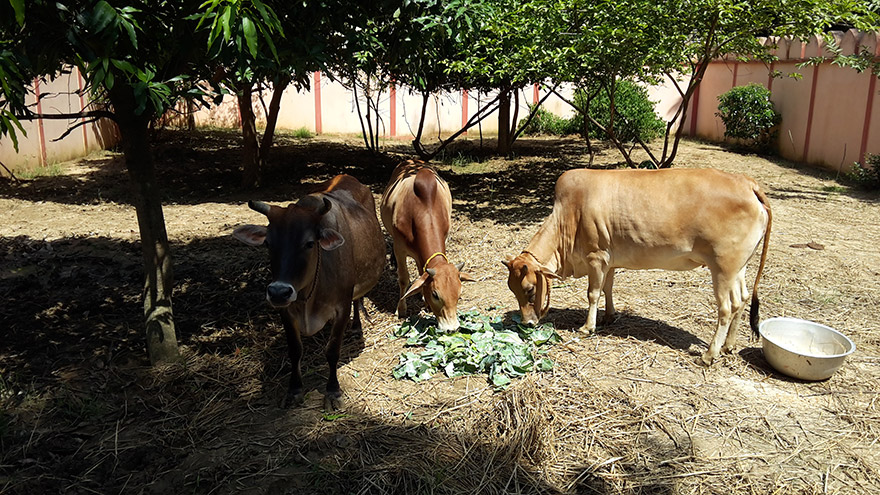
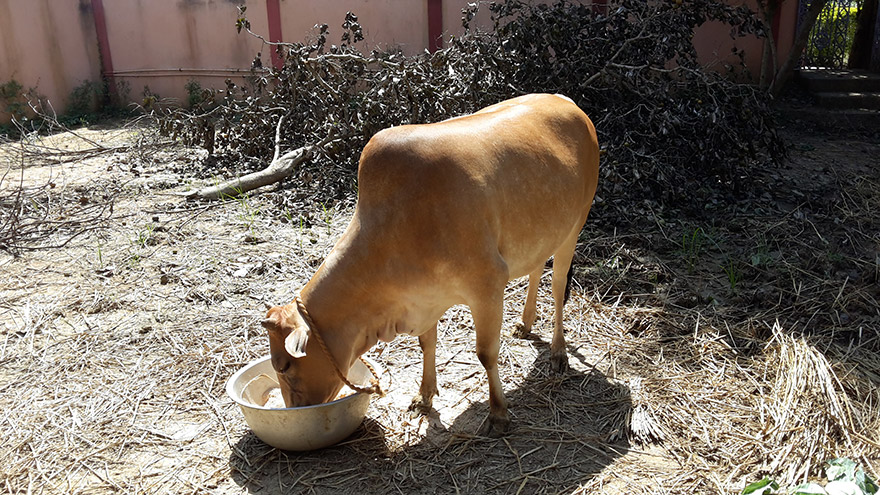
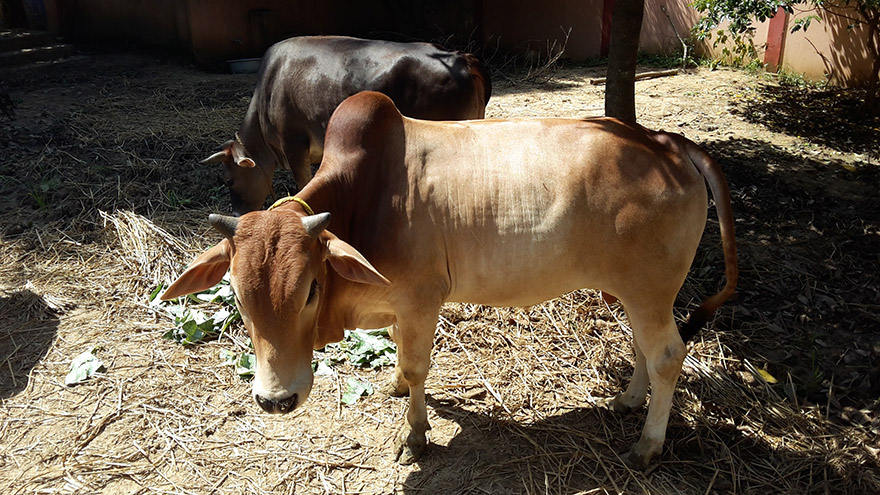
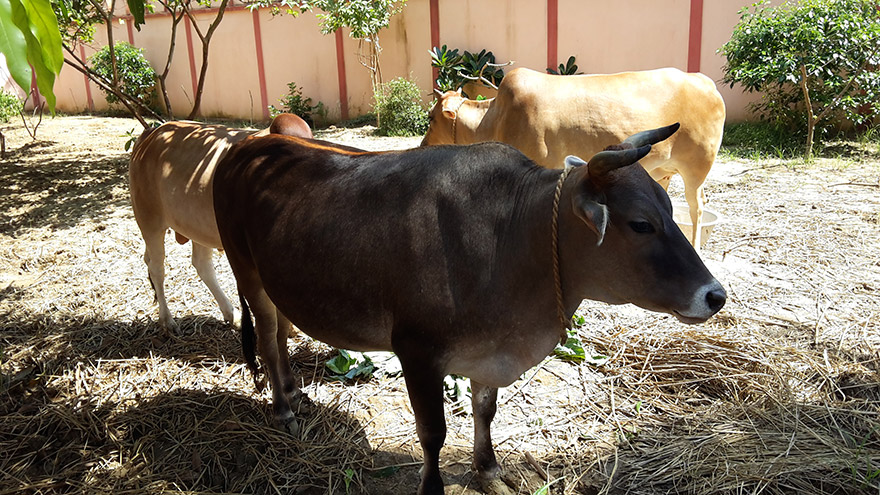
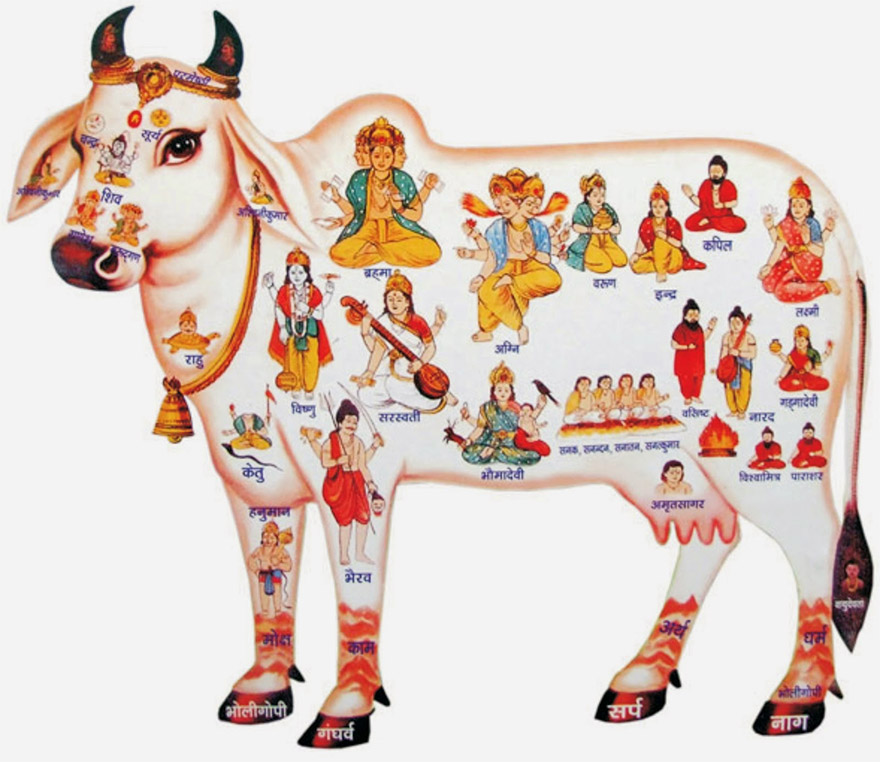
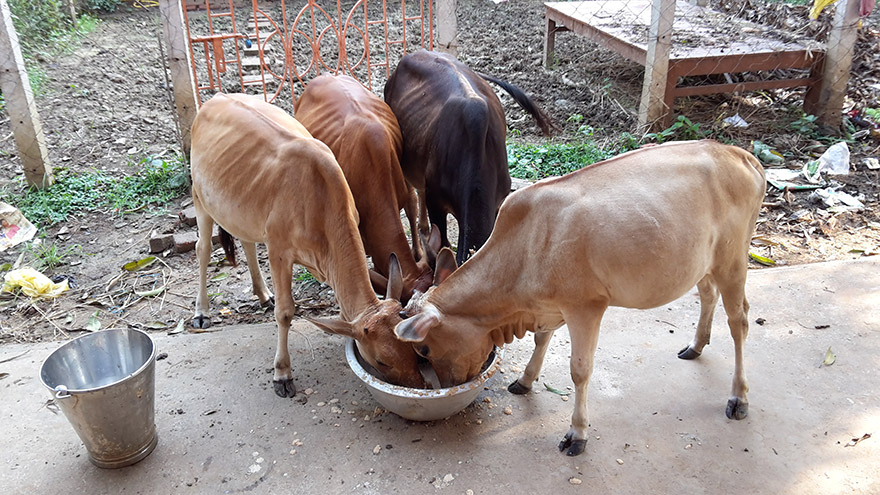
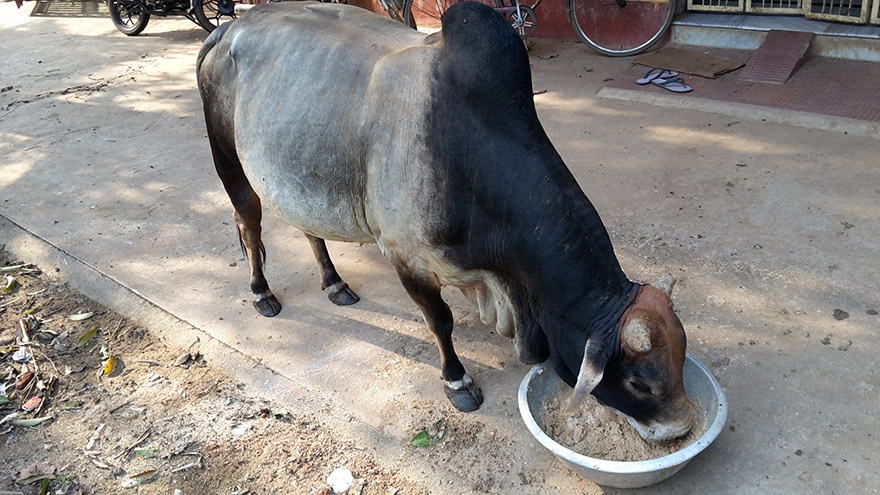
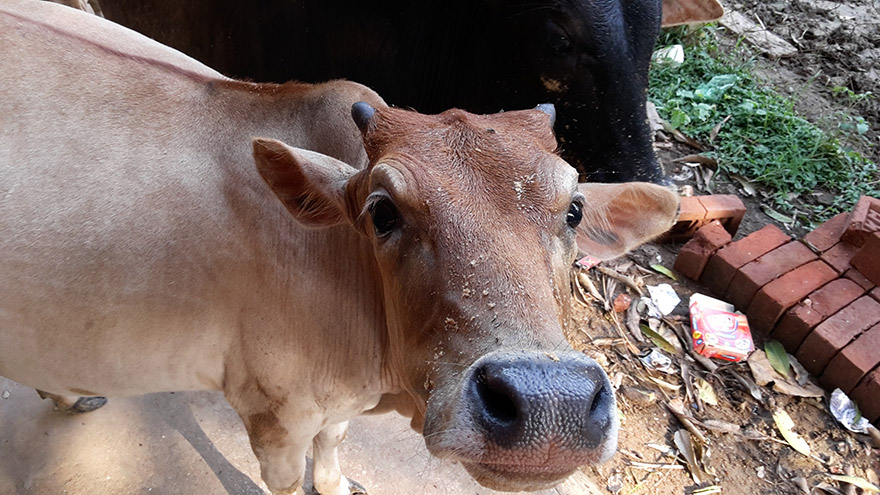
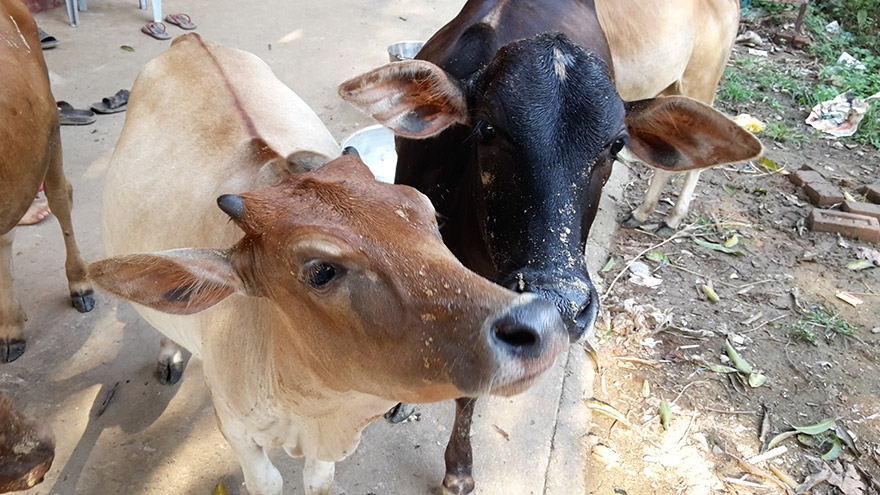




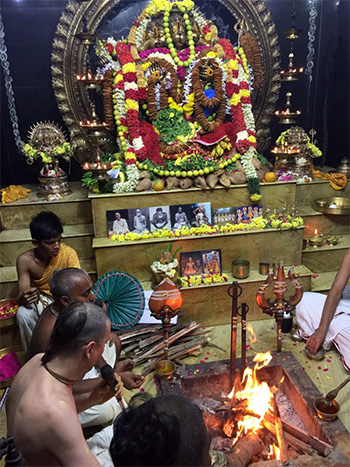
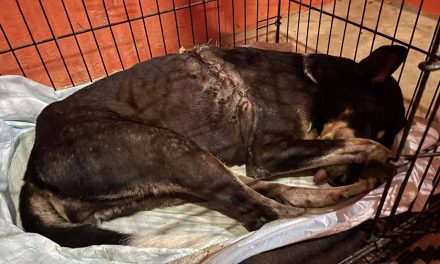
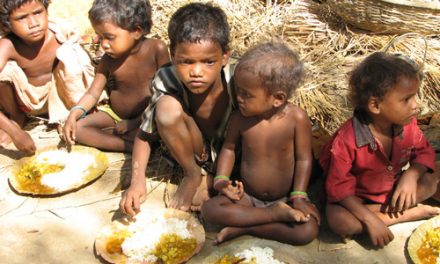
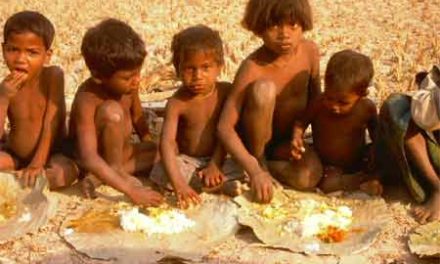
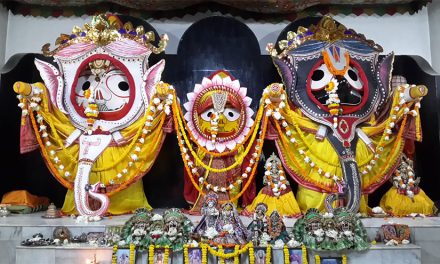
This is a beautiful article regarding the cows and bulls. I and my family (devotees of Lord Krishna) are all vegan. So not only do we not eat meat, eggs or fish but we do not consume any dairy products, nor do we wear any leather. In the UK it is easy to purchase plant milk and because there is such cruelty in the dairy industry here, to say nothing of the horror of the slaughterhouses, we feel able to show our respect and love for God and all of God’s creation by following a vegan diet.
All Glories to Mother Kamadhenu and Father Nandi in the form of your lovely cows and bulls, as well as all of them everywhere. Beautiful article, thank you. I look forward to participating in your feeding program and feel so blessed to have such an opportunity!
In the current situation in this world, Nature gets last Priority there are talks and talks but NO concrete action ever follow,
Not one leader in the world has Guts to act & act fast in public intrest….. I am a Hindu , we are thought that the GOD created the world so everything we see are his creations, As a human how can I kill his creations just for hunger….Killing and eatings is a animal tendency,, we are humans should have a better way to live.
Cows whose milk we consume.. substitute Mothers milk…. Remember she is just like mother eventhough a animal…. so she is Holy…. There can be many explanations for all WHY & What in this world You may get bored,
thanks
The Vedas say Pashun Paahi protect the animals; Gaam maa hinsi, Avim maa hinsih, Dvipadam chatuspadam maa hinsih do not injure the cows goats bipeds quadrupeds. The 5th mahayajna is the Balivaivadeva Yajna that is the 5th daily great duty is to take care of the animals, to feed them to protect them. Maharishi Svami Dayanand Sarasvati wrote a book called GOKARUNANIDHI as an appeal for cow protection. The English version is called an ocean of mercy to the cow.
Beautiful thought provoking article.
Lovely to read. However as a vegan I live with respect and honouring of all sentient life, no eating or using of any animal products including ghee.
Cows are beautiful sentient beings.m
This is a beautiful article. I thank you for it.
When I went to France for the first time in 1973, an old woman who was related to a friend of mine asked the question whether cows, bulls, buffaloes and sheep were allowed to roam freely on the road causing the traffic to slow down. She could not understand why they were not slaughtered for food. I started thinking what will happen to the nation’s economy if this was done and none of these animals were given the freedom to roam around as they pleased. The situation has not changed much even now. I had to come up with some reply. I thought of Lord Vishnu’s 10 avatharams in which he appears as a fish, tortoise, boar, lion, a pigmy, a woodcutter, archer, cowherd and finally a horseman. I told her that we see god in all these incarnations and we cannot hunt them for food. We have enough space to grow grains and these animals are useful for our economy as well, because our entire village economy is based on such animals helping mankind. I do not whether she understood what I said. Perhaps she considered it as a joke and laughed it off!
Much gratitude to you for your loving work for the Human children and the beautiful Cows and Bulls …
gomatre namaha!!!!!
Fantastic article and mind blowing.
I will forward to all my friends.
Beautiful article about the cows, animals understand love & kindness, I admire you people for doing whatever you can for the cows , bulls & the beautiful children.
I pray from my heart for all.
Wonderful videos of the sacred cows and bulls. I wish to donate whatever I can whenever I can. Makes me proud to follow Hinduism.
Man can get food by any means but poor animals? Bhootadaya ia the most important dharma!
It is very moving article.
Thank You !
Regards
This is so nice, all creatures should be protected. But if possible copulation of non indigenous cows breed (humpless) should be avoided.
Consuming milk products from protected cows is essential when following a Vedic lifestyle. Vegan is only as a last resort when no Ahimsa dairy is available. 🙏
the India is the birth place of True asailam of all living things
On this earth not cows alone. but to sustain living we need
Harm_- less mlik and it’s produce, hence the milkers protection!
Great to see this web page and read these great articles and encouraging comments. Thanks for everything.
To Protect cows, How can we ensure that It is more profitable for common man (even a non believer) to protect and feed cows than selling them ?? This is the real point which can quickly give solution to end inhuman slaughtering of cows and instead protecting them and feeding them.
I think one good way is to figure out a way to prepare by-products from Cow dung, cow urine and also Cow’s ability graze. There seem to be many studies already done on these – specially how helpful is Cow urine to prepare a natural pesticide and insecticide for good crops and rejuvenating the soil. But It will be great if these thoughts and ideas are converted into a sustainable proposition with an intent to facilitate setting up retirement homes for Cows where they can rest in peace while their urine and dung makes economical sense for the patron to let them rest in peace!! Kindly forward any ideas around that to my mail id [vidyasagarbb at g.m.a.i.l(dot)c.o.m] or post them here.
Thank you,
Srila Prabhupada always emphasized the care and protection of the cow and the bull; In addition to consuming milk for being a complete food to feed and nurture intelligence. If a child does not drink milk during his childhood, it is certain that he will not achieve the necessary neural connection, to develop intelligence and to be able to understand the sastras, and also he cannot be a good person. But now with the advance of Kaliyuga, we are seeing people who are accepting that sociological experiment called veganism, which only with time, will give statistical data that something did not work. But it will be too late.